Part 1 - A nasty dose of reality - Part
3 - Dawning of a new era - Results and table
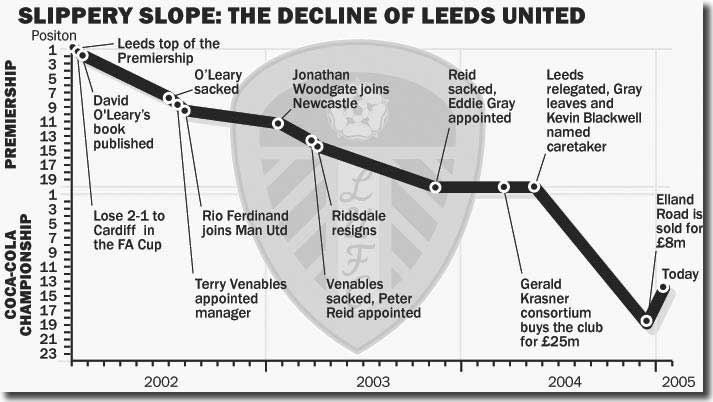 After
months of speculation it was confirmed on 19 March 2004, that insolvency
practitioner Gerald Krasner had negotiated a deal with the creditors of
Leeds United that allowed Adulant Force, the consortium he fronted, to
take control of the club and save it from the administration that had
seemed inevitable.
After
months of speculation it was confirmed on 19 March 2004, that insolvency
practitioner Gerald Krasner had negotiated a deal with the creditors of
Leeds United that allowed Adulant Force, the consortium he fronted, to
take control of the club and save it from the administration that had
seemed inevitable.
However, for anyone who assumed that the deal would lay United's financial
difficulties fully to rest, there was a nasty shock waiting in store.
It quickly became apparent that the buyout had done no more than earn
the club extra time to remedy their deep-rooted financial ills, and that
further support would be required to put Leeds United back on an even
keel.
As reported in the Telegraph, 'the consortium … gambled on three
things. Firstly, they hoped the team could remain in the Premiership.
They didn't and were relegated with the massive
financial consequences that involves. Secondly, they hoped to raise
millions through a debenture scheme by selling thousands of 20-year season
tickets. With the club in the bottom three of the Premiership and facing
relegation, they sold around 100. And thirdly, they were advised by former
Bradford City chairman Geoffrey Richmond. An experienced football man,
Richmond had left Bradford with huge debts and, only weeks after his involvement
with Leeds was revealed, he was declared bankrupt.'
The Krasner deal had been a decent one, slashing the club's massive debt
from astonishing an £103m down to a much more sustainable £40m:
- Loan from Jack Petchey, secured against Elland Road - £15m
- Directors loans - £4.75m
- Income tax and VAT - £9m
- Former managers, players and agents - £8m
- Other creditors - £3.5m
A club balance sheet in September 2004 listed the following among the
creditors:
- Robbie Fowler £2,106,000
- Danny Mills £1,841,000
- Nick Barmby £1,055,000
- Robbie Keane £400,000
- David O'Leary £356,000
- Peter Reid £355,000
- Stephen McPhail £311,000
- Dominic Matteo £181,000
- Danny Milosevic £156,000
- Brian Kidd £87,000
back to top
Clearly, the desperate fire sales to rid the squad of some of the highest
earners in the country had come at a significant cost and there was bitterness
at the need to pay off players who had let the club down so badly. The
moves had demanded extensive use of agents and a Football League report
later revealed the extent of the damage. Leeds United had paid out £1.6m
in agents fees in the six months to 31 December 2004, comfortably the
highest amount paid by any club.
It was certain that Leeds would still have the highest wage bill in the
Football League in the new season, despite selling a host of stars. The
club had already slashed their annual salary costs from £57m to £41m in
the past year, but now planned further reductions.
Gerald Krasner: 'We will have to trim the squad slightly. That is largely
because we are still having to subsidise the wages of some players we
have got rid of. A player may have been on £40,000 a week here but only
receive £20,000 or £25,000 elsewhere, and we have to make up that shortfall
on his contract. Unfortunately in most cases there is no other way of
reducing our wage bill, some supporters do not seem to realise that. The
simple fact remains that if we do not start to live within our means there
will be no future for Leeds United. There were 18 players earning over
£1m a year when we came in and the total wage bill was over £40m. It is
down to an £18m maximum this season but, in order to ensure a viable future,
we still have to get the financial model right.'
To get that into some sort of context, £18m was still twice the First
Division average and six times the £3m paid out by Sheffield United. Krasner
recalled, 'We were paying one of our players more than Sheffield United
were paying their whole squad.'
Kevin Blackwell: 'Going into August, I had two contracted players available,
Gary Kelly and Michael Duberry. There were two others on the books, Seth
Johnson and Eirik Bakke, but they were both injured. The place was like
the Marie Celeste. I got 64 trialists in, from all over the world, panning
for gold. They were hard times.
'The Inland Revenue started calling in debts, and all our money was disappearing
into a black hole again, so we sold James Milner. On the Monday he was
"The New Face of Leeds United", by Friday he was a Newcastle
player. That's how it was then - like walking on quicksand.'
There were also bitter complaints that much of the money for the Adulant
Force deal had come from mortgages against the club's few remaining assets,
such as Elland Road itself, on which a £15m loan from Jack Petchey had
been raised. Documents filed at Companies House indicated that the board
had taken out eight new mortgages on property and land owned by Leeds
to fund their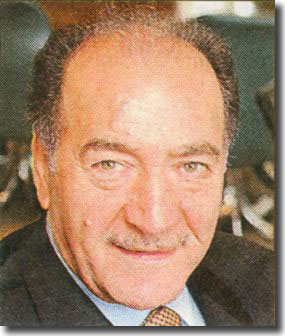 takeover and keep the club afloat in seven months after saving it from
bankruptcy.
takeover and keep the club afloat in seven months after saving it from
bankruptcy.
The immediate need for cash was down to the Petchey loan. The deal had
included significant penalties should any of the repayments be delayed
and Leeds desperately needed to improve their cash flow position.
They were making some good inroads into improving their trading position
by reducing the exorbitant salary bill, but that would only be of any
use if they could get their liabilities down to manageable proportions
with an inflow of cash.
Gerald Krasner negotiated a sale and leaseback arrangement for the club's
Thorp Arch training ground and announced they would try and do the same
with the Elland Road stadium. He also distanced the club from rumours
of a takeover by British-based Iraqi billionaire Nadhmi Auchi.
According to the Sunday Times: 'A former Ba'ath party member whose
brothers were killed by Saddam Hussein's regime, Auchi left Iraq in the
late 1970s to settle in London. He is one of Britain's wealthiest and
best-connected citizens, yet maintains a low profile. Lord Lamont, a former
Tory chancellor, sits on the board of Auchi's holding company and the
billionaire hosts regular dinners attended by royals, Middle Eastern leaders
and MPs. He has also bought tables at Labour fundraising dinners. He has
quietly built a business empire comprising 120 firms across the world
in property, construction and hotels.
'However, his business dealings have often proved controversial. Last
year, in France, he was convicted of paying kickbacks to the oil firm
Elf. Auchi, who was born in Baghdad in 1937, received a 15-month suspended
jail sentence and a £1.39m fine. He says the prosecution was politically
motivated and is appealing against it. In Britain, a pharmaceutical firm
he owns is co-operating in a criminal investigation by the Serious Fraud
Office into an alleged price-fixing cartel involving supplies for the
National Health Service.'
back to top
Auchi's rumoured interest went no further, although it was clear that
Leeds United were actively pursuing other options.
Gerald Krasner: 'From day one we made it clear that we were looking at
two options; remortgage the ground or do a sale and lease back with a
minimum 25 year lease and a buy back clause. That position has not changed
one iota. Leeds fans are entitled to be angry if they think we will not
be playing football at Elland Road but we have always said that whatever
happens, football stays at Elland Road. It is not in the club's interests
to accept a shorter lease than 25 years, that is the minimum. In the talks
we're having there is 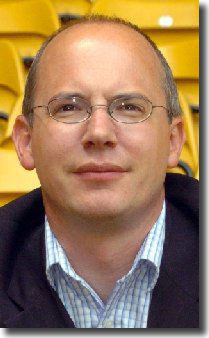 also
a clause to buy back the ground. That's at any point during the lease,
not necessarily at the end of it.'
also
a clause to buy back the ground. That's at any point during the lease,
not necessarily at the end of it.'
The deal for the Thorp Arch training complex, on valuable land near Wetherby,
saw it sold to Jacob Adler, a Manchester-based property developer, and
leased back over 25 years, with United retaining first option to buy back
the land if the financial situation were to improve. Krasner claimed that
once mortgages on the land around Thorp Arch were paid off, Leeds would
be left with 'in excess of £4m' to go towards reducing debts.
Shaun Harvey, the club's chief operations officer, said: 'In an ideal
world it's not an option we would have taken, but our number one priority
is to reduce this club's debt so it can operate again under normal circumstances.
This arrangement will go a long way to helping us do that. Instead of
paying the mortgage on Thorp Arch, we will be renting it instead, with
the players continuing to utilise the excellent training facilities available
there.'
John Boocock, chairman of the Leeds United Supporters' Trust: 'This is
a sign of desperation and proves that, as owners, they bought the club
on loans and have no money to invest. Nothing is sacrosanct at the club
- if they can sell it, they will. I have no doubt the board would love
to sell Elland Road. Twenty-five years is not a long time in football,
especially to those of us who have been coming to Elland Road for 40 years.
What happens to Thorp Arch when the 25 years are up? I can see Leeds United
having to train in a public park in the future. The only way forward for
a football club in this situation is to develop a strong youth policy.
Everything points to doing that and yet what we are doing is selling off
the very bedrock of a strong youth policy.'
On 18 October, The Times reported that the club had agreed another fundraising
scheme: 'Leeds' attempts to restore financial stability were boosted as
they sold off disused land adjacent to their Elland Road ground. The deal,
which will allow Stanley Casinos Limited to build a casino complex with
a hotel, restaurant, bars, leisure facilities and designer shops on the
newly acquired site, is subject to the reform of the United Kingdom's
gambling laws. Such plans will not have any impact on Elland Road remaining
the club's home, although a sale-and-lease-back arrangement of the ground
has not been ruled out.'
All the time, however, the search was on for more substantial investment
and on 24 October finance director Melvyn Helme hinted that a deal was
close. He would not comment on reports of a potential takeover but said
the board were making progress in attempts to find new money.
'Talks with a number of parties have reached an advanced stage,' he told
the Mail on Sunday. 'It would be wrong to comment on any one person.
I'm not sure which party will come forward in the end. We have had a policy
ever since we took over at Leeds that in view of all the various speculation
there has been, we have never commented on individual situations.
'We have just done a deal for the casino land at Elland Road and we were
talking to four or five casino operators. We have successfully concluded
a deal which is to the benefit of Leeds United and we did not comment
on any part of it before an announcement was made. It would be quite wrong
for us to comment on individual parties at this stage because at the end
of the day I am not sure which party will come forward and do a deal with
us.
'We are at an advanced stage of negotiations with various people and
we have to have a look at all the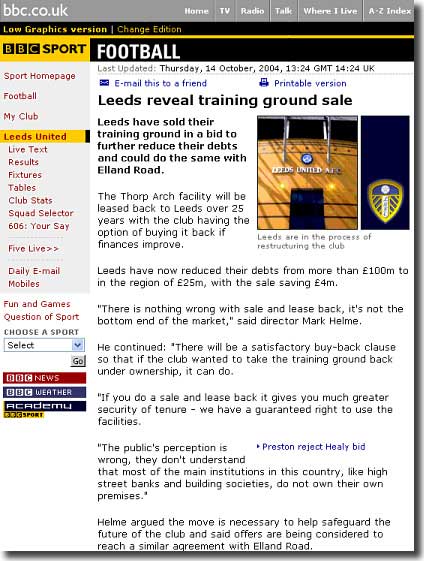 options on the table and choose the best one for Leeds United.'
options on the table and choose the best one for Leeds United.'
Towards the end of October, details started to emerge of two potential
suitors, despite the board's attempts to keep matters under wraps.
The first was a consortium led by Sebastian Sainsbury, 41, banker and
restaurateur and the great grandson of the founder of Sainsbury's supermarkets.
He had enlisted the financial backing of an American group, Nova Financial
Partners, run by the Miami businessman, Burl Sheppard, described as a
'hi-tech fundraiser'.
back to top
The second interested party was a group of local businessmen and Leeds
United supporters, headed by property tycoon Norman Stubbs.
It was soon apparent that there was a degree of antagonism between United's
directors and Sainsbury and that the board were more favourably disposed
to the Stubbs connection.
The Sainsbury proposals were based on an injection of £25m in new funding,
negating the need to sell the Elland Road stadium, but the Stubbs deal
depended on a sale and leaseback arrangement. The board insisted on seeing
physical proof that Sainsbury had the necessary finance at his disposal
and negotiations ended in acrimony with Gerald Krasner claiming that no
satisfactory proof had been forthcoming.
Things came to a head during a show on Radio Aire on Saturday, 6 November
2004 with a heated on-air argument between Sainsbury and Melvyn Helme.
Sainsbury insisted that he had provided proof of funds and claimed a
deal had been completed. A contract would be signed on Monday and the
deal completed by the transfer of funds on Thursday when he would become
club chairman.
Leeds had performed remarkably well in winning 4-2 that afternoon at
Deepdale, home of Preston North End, and Melvyn Helme joined the commentators
for a post match discussion. He was insistent that the club had not received
proof of funds. He explained that the proposals by the Nova group were
acceptable and that a contract would be signed once the required proof
of funds had been obtained. He also complained about the consortium continually
seeking to do their negotiations very publicly. He demanded that Sainsbury
either put up, or shut up.
At this point, Sainsbury joined the conversation by telephone. He said
proof of funds had been provided, though Helme claimed that the club had
only received a letter from a Canadian solicitor, unassociated with the
consortium, which stated he had been asked by them to write the letter.
Sainsbury said that asking for this level of proof was not a normal way
to conduct business. He couldn't understand why the club was delaying
and challenged Helme to confirm the discussion earlier in the Preston
boardroom. Sainsbury was asked why he couldn't simply provide the name
of the bank or an account number, which he declined to do, saying this
was not the way to conduct business. The two men repeatedly spoke over
and ignored each other.
The United board was bitterly divided, as reported in the Guardian that
same day: 'Stubbs is understood to have raised £10m and the proposed sale
and leaseback of the Elland Road stadium is expected to bring in a further
£15m. However, his backers insist all monies must be directed towards
the continued survival of the ailing club rather than rewarding those
directors under whose stewardship debts have been reduced from £104m to
slightly more than £30m.
'The current Leeds chairman Gerald Krasner is understood to be content
with Stubbs' offer but his view is not shared by two of his fellow directors,
who are pushing exclusively for Sebastian Sainsbury's Anglo-American consortium.
Sainsbury initially offered two board seats to the incumbents and a £2m
sweetener to the current directors, a proposal which is the subject of
further negotiation.
'However, in taking out £4.75m in directors' loans which helped facilitate
the initial Adulant Force buy-out of the club, the board used their homes
and businesses as security. Should both current takeover bids fail, directors
stand to lose their estates if the club goes under.'
The club's fractious impatience with Sainsbury and continual demands
to 'show us the money' were perhaps excusable - things were getting fraught
at Elland Road.
The club still owed £9.2m on the loan from Petchey and the next instalment
of £2.5m was due on November 14, with a £2m penalty if the payment was
missed. The United board set Sainsbury a deadline of 1pm on Friday, November
12 to complete the deal, which was always far too tight in the circumstances.
Sainsbury chose to back out and the club was left with little option but
to sell Elland Road. They arranged a 25-year leaseback deal with Manchester-based
businessman Jacob Adler, who had also bought Thorp Arch. The arrangement
allowed the debt to Petchey to be cleared in full and put around £8m in
the bank.
back to top
35-year-old Adler later sought to assure the fans that 'Your ground is
safe with me' and that he had 'no intention whatsoever' of building on
the site. In an interview with the Yorkshire Evening Post he also
rubbished claims that he had secret ties to the men who were on United's
board when the sale went through: 'I had never met Mr Krasner before,
I had never dealt with him before. Categorically, I had no connection
with anyone at Leeds United. [The transactions] came about through a property
agent who knew that Leeds were looking to sell and I might be interested
in buying. I have been described in the press as a property developer.
I have never developed anything in my life. I invest in property, and
this was commercially a great chance for me.'
While the sale might have made sound business sense it had enormous symbolic
significance to the supporters of the club, who despaired, convinced that
the directors' only strategy was to liquidate all their assets in a slow
and inevitable grind towards financial oblivion.
The Stubbs consortium was still interested and there were continuing
hints of a successful conclusion to discussions, but weeks went by with
no concrete news.
As December opened, there came another crisis as the club announced a
payment of £1.2m to the Inland Revenue was due on the 15th of the month
with an £800,000 VAT bill to be settled shortly afterwards. The club defaulted
on the payments and staggered on uncertainly until 17 January when they
announced that they had only 10 days left to avoid administration.
Kevin Blackwell: 'One Friday in January, out of the blue the stock exchange
pulled the plug. It was a terrible day, with staff crying all around me.
We weren't going into administration - that had already been done and
all the assets had been sold - it was straight to liquidation. The doors
were going to be closed on the Monday. We'd all had e-mails, saying we
wouldn't be paid. The wages had only been paid in December because I sold
Scott Carson to Liverpool.'
Then in the nick of time there was some astonishing news, as former Chelsea
owner Ken Bates came into the equation. The irascible and controversial
73-year-old had stepped down as chairman at Stamford Bridge after the
arrival of Russian billionaire Roman Abramovich. Under the terms of that
deal, which saved Chelsea from financial meltdown and netted Bates a personal
windfall of £17m, he was due to remain as the chairman until the end of
the season, when he would have become a life president. The appointment
of Peter Kenyon as Chelsea's chief executive led to conflict, and Bates
cited 'a clash of Eastern and Western cultures' as he made an earlier
exit than planned. Over recent months Bates had attempted to take control
at Sheffield Wednesday but his overtures had been unsuccessful.
The first hint of Bates' possible involvement with United came in a report
in the Independent on 10 January:
'In a move that is likely to stun Leeds supporters and arouse curiosity
much further afield, Bates, 73, is understood to have offered the money
to become part of a takeover at Elland Road being attempted by Sebastian
Sainsbury. Although a deal is still some way from completion, talks between
Sainsbury and the Leeds chairman, Gerald Krasner, are ongoing about a
£25m buy-out. The next round of talks is scheduled for tomorrow.
'Bates and Sainsbury, accompanied by brokers and agents, were seen lunching
together at the Dorchester Hotel in central London last week. According
to one source, Bates told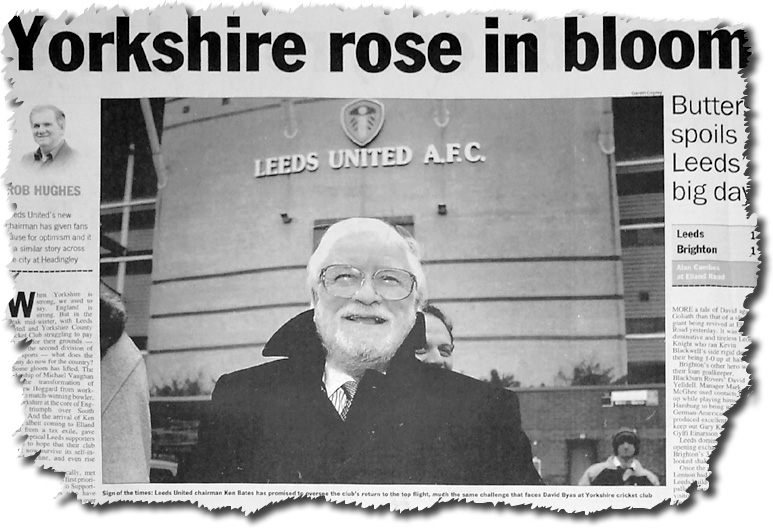 Sainsbury he would invest £10m in Sainsbury's consortium in exchange for
51 per cent of Leeds and the role of chairman.'
Sainsbury he would invest £10m in Sainsbury's consortium in exchange for
51 per cent of Leeds and the role of chairman.'
Sainsbury's deal collapsed shortly afterwards and it seemed that the
Stubbs consortium was the only show in town as bankruptcy beckoned. But
the interest of Ken Bates had been piqued and a shock takeover was completed
at 2.27am on Friday 21 January 2005.
back to top
Under the auspices of the Geneva-based Sports Forward Fund, Bates invested
around £10m in Leeds United, securing a 50% controlling stake. He would
have gone for a larger holding, but the finer details of Adulant Force's
settlement with the bondholders in 2004 meant that the sale of any greater
share would have incurred significant financial penalties. The restriction
lasted until March 2007, when it was expected that Bates would buy up
the remaining half of Leeds United.
The Bates money cleared £2.8m owing in VAT and tax, a £620,000 loan from
former director David Richmond, an annual payment to bondholders of £1.4m
and a number of other liabilities, bringing the total debt down to around
£17m. A repayment schedule was agreed with the Inland Revenue and Customs
and Excise for the remaining £4.2m and it was agreed that £4.1m of other
directors' loans would remain invested in the club for a further four
years, leaving Bates to crow that only £9m was 'outstanding'.
The figures quoted did not include a schedule of 'League Performance
Amounts' that were agreed with the bondholders as part of the Adulant
Force takeover. An annual sum of £1.4m was owed annually until 2008, rising
to £2.5m in the Premiership, with an additional one-off payment of £5m
payable on promotion. The deal could also see the club paying £500,000
per year until 2025.
The investment by Bates rescued the club as it seemed all hope was gone,
but the new chairman was a controversial figure in football circles, and
some United supporters reacted angrily to his involvement.
John Boocock: 'This is the man who wanted to put up electric fences at
Chelsea and his business track record leaves a lot to be desired. At no
point has he shown any interest in Leeds as a club or a city. He just
wants to have a toy to play with. If he is doing this without due diligence,
he is not aware that the club needs far more.
'My mother has just rung me and asked should we laugh or cry and I told
her to cry. We wouldn't want him to come to Leeds as a visiting director,
let alone become our new chairman. He's an old man who should stay at
home and look after his garden. If he wants a bit of excitement he can
go to bingo or take his wife to WI meetings. Bates is just a carpet-bagger
who will buy any club that will have him in the hope that he can get back
his seat on the FA. This just shows how little chairman Gerald Krasner
and his colleagues know when it comes to Leeds United and the fans. They
are just in this for whatever they can get themselves.'
Simon Jose, of the Leeds United Independent Fans' Association: 'I would
rather we started afresh in the Conference than have him in charge. It's
like the four horsemen of the apocalypse selling to Lucifer. We need a
clean sweep and a fresh start. This is like putting King Herod in charge
of babysitting.'
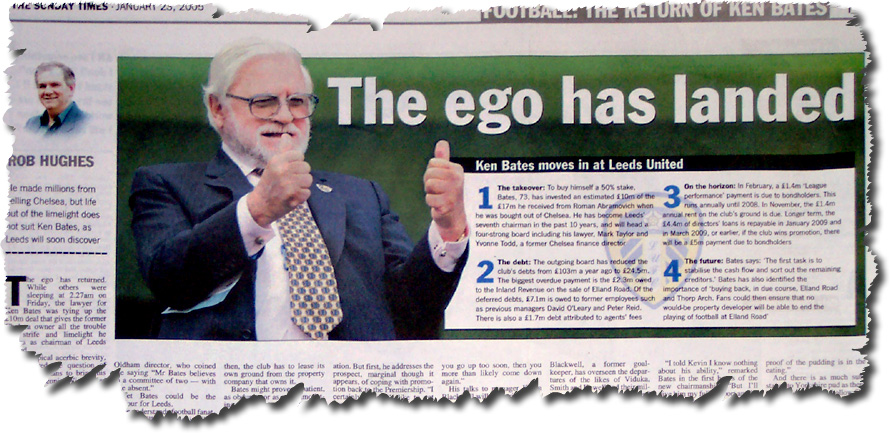 There
were some welcoming words, however, from others. Peter Lorimer, whom Bates
asked to remain a director: 'The board did a great job knocking £80m off
the debts but now the club has to go forward and I'm sure Ken is the right
man. I'm sure he knows what is needed and what to do about the finances.
The team has been rebuilt and we are moving ahead.'
There
were some welcoming words, however, from others. Peter Lorimer, whom Bates
asked to remain a director: 'The board did a great job knocking £80m off
the debts but now the club has to go forward and I'm sure Ken is the right
man. I'm sure he knows what is needed and what to do about the finances.
The team has been rebuilt and we are moving ahead.'
Norman Hunter: 'I'm delighted. First and foremost, the situation is resolved
at the moment. It was a trying situation and I don't think it's enough
in the long run but I think Ken Bates will sort something out. If he does
anything like the job he did at Chelsea, the Leeds public will be absolutely
delighted.'
back to top
Outgoing United chairman Gerald Krasner: 'We met Ken Bates on Monday
in London and discussed at length the outline of the deal that was necessary
for Leeds United. We shook hands on it and the board backed it unanimously
on Tuesday. We got him into Leeds on Wednesday without anybody knowing
and this morning it was concluded. I have to pay tribute to Ken because
he has not moved one iota from the handshake we had on Monday. He's sat
down with us man-to-man, not done due diligence and I like the way he
does business. He's kept his word and you can't ask for any more.
'What this takeover will enable Leeds United to do is consolidate its
position much quicker than the old board was able to do. The debts were
£103m and are now under £25m. We have done 80% of the work; Ken will do
the rest and take Leeds United back to the Premiership where they belong.
'Ken has long term plans here, he's had a year's sabbatical and he's
come back to show everyone he can do it all again. I think that when the
Leeds fans hear his plans they will be pleased.'
Former chief executive Trevor Birch, who knew Bates from their time together
at Chelsea: 'Ken's involvement is good news for Leeds. The club has suffered
a lot in recent years and one thing about Ken is he is a very determined
man. He will not have bought Leeds to preside over its demise. He will
have very definite plans, you only have to look at the success he has
achieved in the past to realise he will not want the club to stand still,
which can only be good news for the fans.'
Bates had always provoked extreme views among the football public, with
people either loving him or hating him. His long and chequered past had
guaranteed that controversy would dog him wherever he went.
Ken Bates was born on 4 December 1931 and spent his childhood on a council
estate in Ealing, West London. He showed an aptitude for business from
an early age and made his money from ready mixed cement, dairy farming,
sugar cane and land development.
Despite his commercial interests, Bates was always a football fanatic
and took over at Oldham Athletic in 1965. He shook up a sleepy little
club, swapping bright orange shirts for the traditional blue and white
colours, and he brought in a number of new players for his first game.
He later took control of Wigan Athletic for a brief period in 1981 before
buying up a debt-laded Chelsea a year later for £1 as they teetered on
the verge of relegation to the old Third Division.
For five years from 1986, he served on the Football League management
committee before resigning after Chelsea were fined £105,000 for alleged
illegal payments to players.
In the early 1990s, Bates formed Chelsea Village Limited with the ambitious
intention of transforming the Stamford Bridge ground with a hotel complex
and other leisure pursuits. On the footballing side he gambled on Glenn
Hoddle as manager before losing him to the England job, and went on to
hire and fire Ruud Gullit and Gianluca Vialli in the pursuit of further
success, with both managing to bring silverware to the club during short
and controversial stays.
He managed to transform an outdated and dilapidated Stamford Bridge into
a modern, state of the art stadium and did likewise with the football
team, although Chelsea's debt rivalled United's in the year preceding
their rouble-fuelled revolution. The Stamford Bridge deal had injected
new wealth into the surrounding neighborhoods, resulting in new jobs and
many homes for sale. Would the same thing happen at Elland Road?
In 2003, Bates sold his controlling interest in the club, apparently
to retire to a Monaco tax haven. He couldn't stay away from football forever,
though, and came close to investing in Sheffield Wednesday before declaring
his interest in 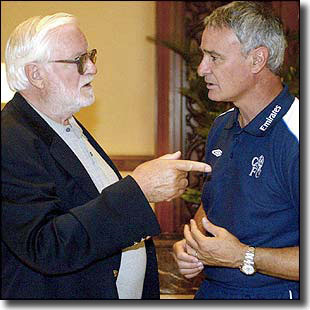 Leeds
United.
Leeds
United.
Bates was best known for his acerbic nature and his controversial comments
on the game and people within it:
- On the Football Association's disciplinary procedures: 'At first they
were a shambles. Now they have descended via farce to make them a laughing
stock. It has come to a pretty pass when FIFA criticise our performance.'
- 'I got calls from Italy last summer and one agent offered me Batistuta.
He told me "Batistuta wants to come to Chelsea." I said "I'm
sure he does, but we've stopped signing pensioners."'
- On being ousted from the board of Wembley National Stadium Limited:
'Even Jesus Christ only had one Pontius Pilate - I had a whole team
of them.'
- 'Take Ruud Gullit. I didn't like his arrogance. In fact, I never liked
him. But while he was delivering the goods, there was no problem. When
he lost the plot he had to go.'
- 'It takes one to know one. I'm surprised Martin O'Neill actually knows
a word as big as cretin.'
- 'I'm delighted for Claudio Ranieri that we beat Fulham in the FA Cup
semi-final, as if we'd lost yesterday, it would have been a pity to
sack him just after he'd signed a new contract!'
- 'All those toilet rolls coming on from Besiktas fans was orchestrated.
They wanted to get the kick-off delayed so they would know what the
other result was before our game finished. I said to Roman Abramovich,
"if you fancy making another billion, go and open another toilet
roll factory in Turkey."'
back to top
It was clear that, with the colourful Bates around, life for Leeds United
would never be dull, and there would be plenty of controversy along the
way. Opinion was sharply divided and there seemed to be as many people
saying that Bates would destroy the club as those who saw him as a refreshing
new broom, bringing with him heavy doses of reality and business acumen.
Shortly after the takeover, the Yorkshire Post carried a story
of a bid to derail Bates' plans. Simon Morris, the club's leading shareholder
before the deal, was offered an incentive of £250,000 by a rival consortium
to stall negotiations. Morris was offered the money just hours before
Bates formally took charge of United.
'The approach came from charity fundraiser Stuart Levin, who asked Morris
to "put a stop" on the Bates deal and offered to pay the money,
claiming a rival consortium's funds were just 24 hours away from being
available. The offer was dismissed, however, and Bates duly completed
his takeover in the early hours of January 21.
'Three consortiums were bidding for the club at the time - one led by
Bates, another by United season ticket holder Norman Stubbs and a third
mystery 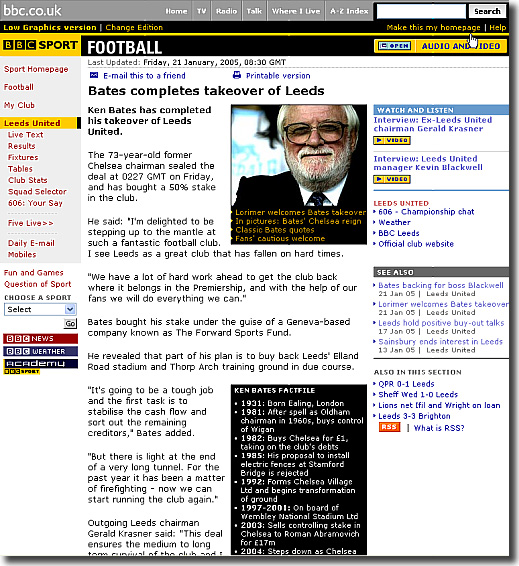 group
on whose behalf Levin made the approach. The drama unfolded on Thursday,
January 20 when go-between Levin, in the offices of chartered accountants
Haines Watts, made the offer to United director Morris, who was in the
offices of the club's solicitors, Walker Morris.
group
on whose behalf Levin made the approach. The drama unfolded on Thursday,
January 20 when go-between Levin, in the offices of chartered accountants
Haines Watts, made the offer to United director Morris, who was in the
offices of the club's solicitors, Walker Morris.
'Levin asked: "What do you want to put a stop on it in the next
24-48 hours?" Later in the conversation, he offered to pay £250,000
using an American account, and then promised "we'll give it you in
writing now."
'Morris, who yesterday said he treated the offer light-heartedly, responded
by asking: "Can they make a cheque payable to my granddad?"
'Levin said yesterday: "It is true that I did, on behalf of the
consortium I represented, which consisted of die-hard Leeds United supporters
and businessmen, offer Simon Morris an incentive to hold back on any other
deal as I knew our funds were 24 hours away. He said he was very interested
and asked how the incentive would be paid. I said that upon completion
of our deal that he should provide a bona-fide invoice so everything would
be above board. I never heard from him again about this matter. Speaking
as a Leeds United supporter of 48 years standing, I think Ken Bates is
doing an excellent job and I wish him all the best."'
Morris said: 'I was being offered money to stop the deal with Ken Bates
going through. The only way I could treat it was light-heartedly and with
contempt. I was surprised by the nature of this when we were so close
to securing the future of the club.'
Melvyn Levi, a fellow director of Morris at Elland Road until Bates'
takeover, said there was no chance of the former Chelsea chairman's takeover
being halted. He told the Yorkshire Post: 'The offer was made in
an open meeting and the lawyers heard it. But we had met Ken Bates the
previous Monday and we were set to complete on the Friday - as far as
I am concerned, you cannot do any better than that. He had his lawyers
working through the night to get the deal done, that was a clear sign
of his intent, and there was no doubt he was the one who was going to
save Leeds United. We had stabilised the club and wanted someone to take
it forward. There was no way we would rely on someone saying "the
money will be here in 24 hours" - we had heard it all before. We
had had too many false dawns in the past, but it was clear Ken Bates was
not a false dawn. All these rich people in Leeds had had 10 months to
sort a deal - we had always said from the start that we would talk to
anyone who came along with a sensible offer to take over the club. Ken
did that and took the chairman's statement that all the figures were correct.'
It was a controversial story, but only in keeping with all the speculation
and innuendo that Elland Road had seen so much of over the previous couple
of years. Whatever the reality, one thing was clear: Bates had saved Leeds
United Football Club from oblivion and they could finally dare to hope
for a bright new future.
Part 1 - A nasty dose of reality - Part
3 - Dawning of a new era - Results and table
back to top












 After
months of speculation it was confirmed on 19 March 2004, that insolvency
practitioner Gerald Krasner had negotiated a deal with the creditors of
Leeds United that allowed Adulant Force, the consortium he fronted, to
take control of the club and save it from the administration that had
seemed inevitable.
After
months of speculation it was confirmed on 19 March 2004, that insolvency
practitioner Gerald Krasner had negotiated a deal with the creditors of
Leeds United that allowed Adulant Force, the consortium he fronted, to
take control of the club and save it from the administration that had
seemed inevitable. takeover and keep the club afloat in seven months after saving it from
bankruptcy.
takeover and keep the club afloat in seven months after saving it from
bankruptcy. also
a clause to buy back the ground. That's at any point during the lease,
not necessarily at the end of it.'
also
a clause to buy back the ground. That's at any point during the lease,
not necessarily at the end of it.' options on the table and choose the best one for Leeds United.'
options on the table and choose the best one for Leeds United.' Sainsbury he would invest £10m in Sainsbury's consortium in exchange for
51 per cent of Leeds and the role of chairman.'
Sainsbury he would invest £10m in Sainsbury's consortium in exchange for
51 per cent of Leeds and the role of chairman.' There
were some welcoming words, however, from others. Peter Lorimer, whom Bates
asked to remain a director: 'The board did a great job knocking £80m off
the debts but now the club has to go forward and I'm sure Ken is the right
man. I'm sure he knows what is needed and what to do about the finances.
The team has been rebuilt and we are moving ahead.'
There
were some welcoming words, however, from others. Peter Lorimer, whom Bates
asked to remain a director: 'The board did a great job knocking £80m off
the debts but now the club has to go forward and I'm sure Ken is the right
man. I'm sure he knows what is needed and what to do about the finances.
The team has been rebuilt and we are moving ahead.' Leeds
United.
Leeds
United. group
on whose behalf Levin made the approach. The drama unfolded on Thursday,
January 20 when go-between Levin, in the offices of chartered accountants
Haines Watts, made the offer to United director Morris, who was in the
offices of the club's solicitors, Walker Morris.
group
on whose behalf Levin made the approach. The drama unfolded on Thursday,
January 20 when go-between Levin, in the offices of chartered accountants
Haines Watts, made the offer to United director Morris, who was in the
offices of the club's solicitors, Walker Morris.